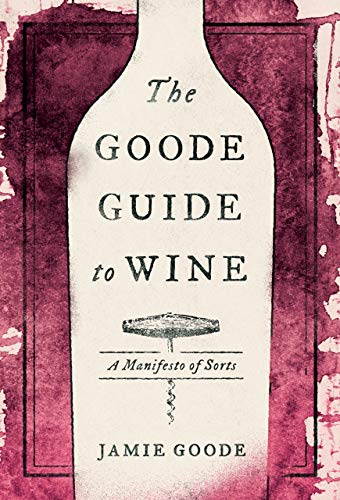My Favorite Wine Book of the Year
 Let me state right out of the gates that Jamie Goode’s new book, The Goode Guide to Wine: A Manifesto of Sorts, is a fabulous read, very unique in its form and structure, entertaining, thoughtful and quite easily one of the best wine books released this year. I also disagree with much of what is in it, yet I can’t seem to stop picking it up and re-reading it.
Let me state right out of the gates that Jamie Goode’s new book, The Goode Guide to Wine: A Manifesto of Sorts, is a fabulous read, very unique in its form and structure, entertaining, thoughtful and quite easily one of the best wine books released this year. I also disagree with much of what is in it, yet I can’t seem to stop picking it up and re-reading it.
In what is a relatively small little book comprising a short 233 pages, Goode shoves in 55 brief chapters, each of which addresses some aspect of the various and most important issues that wine lovers and the wine trade like to debate and discuss. It looks suspiciously like a collection of 55 different blog posts, but it truly does boil down to exactly what Goode calls it: A Manifesto…of sorts.
Toward the end of the book’s (short) preface, Goode provides a bit more insight into what he’s trying to do with The Goode Guide:
“In essence, this book provides a philosophical underpinning for fine wine. It is our philosophy that shapes how we act, yet we rarely verbalize these principles and theoretical insights.”
It’s with this early statement of intent that Goode provides the reader with a certain task: suss out Goode’s underlying philosophical understanding of wine, wine drinking, and the wine business. This was in fact the task undertook in diving in.
What’s clear is that Goode embraces the mystery of wine and believes its properties, source and man’s relationships with the drink are worthy of reverence: “Be humble in the face of wine,” writes Goode in Chapter 7: Wine Resists the Proud. “It is an endlessly complex subject, changing with each vintage. Indeed, wine is beyond any single human’s ability to understand to any serious degree. We only see it in part.”
The irony here is that Goode is a scientist by trade, trained in plant biology and with an impressive  career of working in the field. Yet here he is, at the start, reminding us that wine’s complexity and mystery is something to embrace. And he makes this case convincingly in a short 3-page chapter where his familiar and straightforward writing style is on display as he makes a convincing case for leaving behind any concern with wine’s complexity and mystery and accepting that this quality of the drink we love is indeed what ought to draw us into its midst more fully.
career of working in the field. Yet here he is, at the start, reminding us that wine’s complexity and mystery is something to embrace. And he makes this case convincingly in a short 3-page chapter where his familiar and straightforward writing style is on display as he makes a convincing case for leaving behind any concern with wine’s complexity and mystery and accepting that this quality of the drink we love is indeed what ought to draw us into its midst more fully.
Goode is also a confirmed Terroirist who uses this book to impress upon its readers that wine is nothing but a crass commodity without its links to places, people and moments in time. In a series of entries, Goode implores us to ignore and disdain wines that do not conform to their source and, equally important, the aesthetic traditions of wine places. In this regard, Goode also marks himself as a traditionalist, even a defender of the old guard. But at the same Goode is willing to condemn the wine industry’s focus on what is essentially a traditional and longstanding British approach to understanding and teaching wine that not only depends on the enforcement of terroir standards but teaches it as an unwavering fact. Goode writes in his chapter 52, “All Can Play”:
“No industry survives when second rate people clog up the nice jobs by virtue of having passed some tricky exams, some of them many decades ago. It doesn’t help that many of these exams have a distinctly British focus to them, because these exams, open to members of the wine trade globally, are designed by UK-based educational bodies….It could be argued that to contribute in an excellent way shouldn’t require…a peculiarly British slant on the world of wine.”
Goode goes on to cover an array of interesting topics. He vociferously condemns wine scores (“Scores can be useful, but mostly they are stupid”), rails against big wines (“Monsters aren’t serious”, “The evil of overripeness”), abhors the anti-elitists (“Beware the wine champions” — a great chapter), enjoys excoriating the ways by which the wine trade hocks its wares (“Don’t expect the fish to come to you”), and takes a particularly hard line on celebrity winemakers and rich vignerons (“Celebrity Wines, no thanks”).
There is purist quality to Goode’s philosophy as it is laid out in The Goode Guide in a fragmented way. But there is no question that in offering his thoughts and opinions in these rapid-quick chapters, Goode is honest, complete, and responsible to himself and his readers. The beauty of this little book is that it motivates the reader to stop after each and every entry and think, consider their response to his positions and hone their own. In this respect, Goode’s manifesto is a gift.
I should warn that this is a volume completely unsuited for the casual wine drinker and even for the wine drinker just now starting out and looking to learn. It is, instead, a book that serious wine drinkers and members of the wine trade will savor.

Such a thorough review. It certainly made me want to read the book (I just ordered it). I’m interested that you “disagree with much of what’s in it.” I didn’t get that sense from the body of the review. Thank you for the recommendation! After culling most of my wine library (so many books) I’m trying to keep it to a few really interesting volumes to which I may refer again and again. I do appreciate Jamie Goode’s work (he’s still represented in my smaller collection).
Ordered!